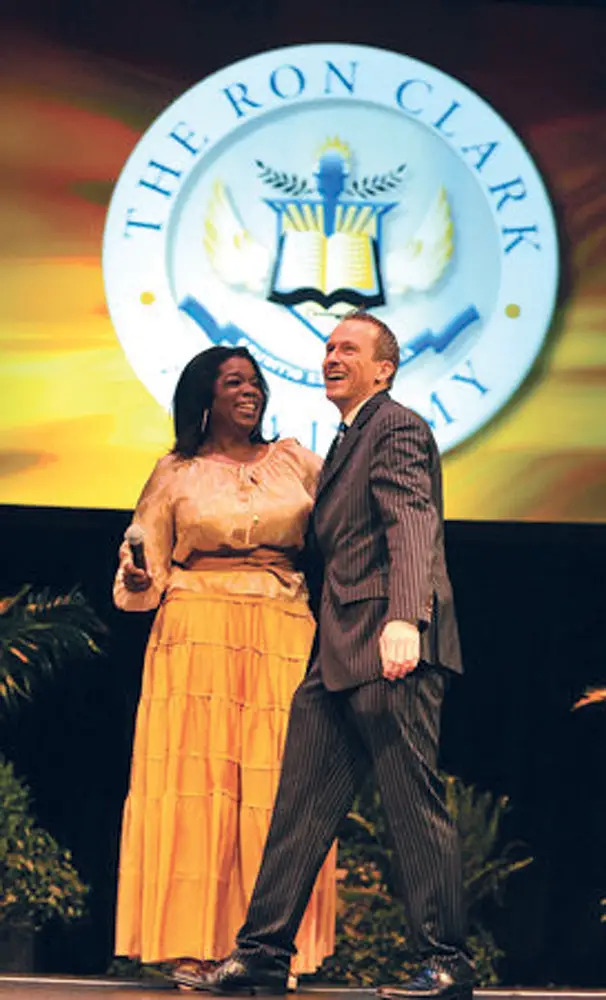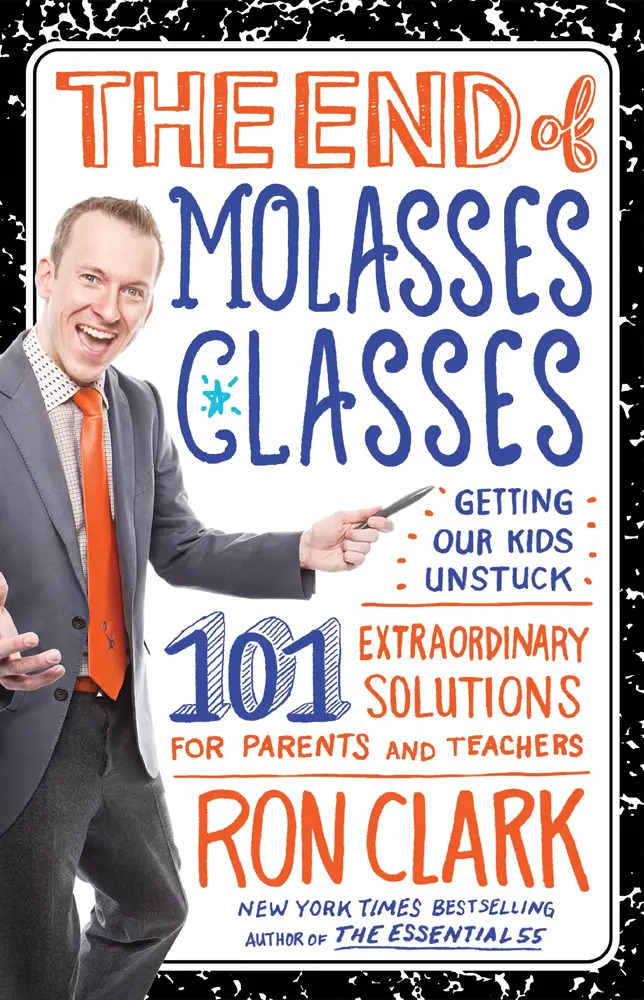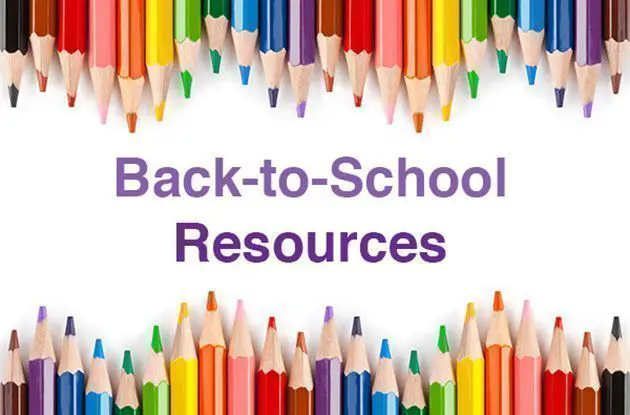“America’s Educator” Ron Clark, author of “The End of Molasses Classes,” talks about how to banish boredom from the classroom, make teaching a desirable profession (again), and what to do when you don’t like your kid’s teacher.
 “I never envisioned myself teaching,” says Ron Clark. The first in his family to graduate from college (with a degree in history), Clark followed that up with backpacking around the globe and jumping from one odd job to another. Then, he “got food poisoning in Romania and flew home to North Carolina, recuperating in the hospital.” Clark describes his various adventures up until then — or misadventures, as his mother might have said — as including everything from streaking across the football field in college to hiding in the oven during a game of hide-and-seek on a shift at Dunkin’ Donuts. Next up, at that time: “a run down the Great Wall of China.”
“I never envisioned myself teaching,” says Ron Clark. The first in his family to graduate from college (with a degree in history), Clark followed that up with backpacking around the globe and jumping from one odd job to another. Then, he “got food poisoning in Romania and flew home to North Carolina, recuperating in the hospital.” Clark describes his various adventures up until then — or misadventures, as his mother might have said — as including everything from streaking across the football field in college to hiding in the oven during a game of hide-and-seek on a shift at Dunkin’ Donuts. Next up, at that time: “a run down the Great Wall of China.”
But his “distraught” parents convinced him otherwise. “My mama just lost it,” he describes. “She said that at a local school, a teacher had just passed away and if I didn’t go teach those kids, they were going to have substitute teachers every day for the rest of the year. I didn’t want to do it, but she told me that if I didn’t at least go and talk to the principal, she’d never support anything I did ever again. So I went to the school. During my visit one student asked, ‘Is you going to be our new teacher?’
“I sort of fell into it, and have loved it ever since.”
From Reluctant to Exuberant
 When he began his teaching career, Clark felt appalled by the blatant lack of enthusiasm and dreary environment in the classroom. He became committed to helping his kids feel energized by the learning material instead of bored or underwhelmed. It wouldn’t be at all unusual to see Clark excitedly leap up on a desk during a lecture, or to change around the lyrics to Rihanna’s hit “Umbrella” in an effort to teach long division.
When he began his teaching career, Clark felt appalled by the blatant lack of enthusiasm and dreary environment in the classroom. He became committed to helping his kids feel energized by the learning material instead of bored or underwhelmed. It wouldn’t be at all unusual to see Clark excitedly leap up on a desk during a lecture, or to change around the lyrics to Rihanna’s hit “Umbrella” in an effort to teach long division.
Since his days as a newbie fifth-grade teacher in South Carolina, Clark went on to spend time teaching in Harlem and later to found The Ron Clark Academy in Atlanta, a private, nonprofit school for fifth- through eighth-grade students.
Today, Clark is a New York Times-bestselling author, was named Disney’s American Teacher of the Year in 2000, has been featured on Oprah,
The Today Show, and CNN, and has even been the subject of a film, The Ron Clark Story (2006), starring Matthew Perry. After publishing his first two books, The Essential 55, and The Excellent 11, Clark debuted a third book, The End of Molasses Classes: Getting Our Kids Unstuck — 101 Extraordinary Solutions for Parents and Teachers, last summer. We sat down with Clark to talk not only about his teaching philosophy, but what parents can do to enhance their child’s education at home.
For parents unfamiliar with your books or philosophy, what exactly are “molasses classes”?
 A: Classes where kids don’t have a spark. They don’t have a passion for learning. There’s no energy. The teacher is either sitting at her desk or standing still in front of the classroom lecturing. There’s no movement, there’s no excitement, there’s no laughter, there’s no joy. Kids aren’t sitting on the edge of their seats, excited about what they’re learning. Their heads are down, they’re slouched over, they’re leaning back, and there’s just no light or love of education in the classroom.
A: Classes where kids don’t have a spark. They don’t have a passion for learning. There’s no energy. The teacher is either sitting at her desk or standing still in front of the classroom lecturing. There’s no movement, there’s no excitement, there’s no laughter, there’s no joy. Kids aren’t sitting on the edge of their seats, excited about what they’re learning. Their heads are down, they’re slouched over, they’re leaning back, and there’s just no light or love of education in the classroom.
Unfortunately, as I travel, I see classes like that all of the time. There’s no urgency and the lessons are being taught with a focus on the kids who either aren’t achieving or are barely meeting standards. No one’s really pushing the lessons to the kids who are achieving standards. I think in our country we assume the higher achieving kids are doing okay because they “already know it,” but shouldn’t we instead be saying, “They already know it, can we push them to learn something else?”
How do you get teachers to instill a “spark” in the classroom if materials are older or the school faces budget cuts?
A: Well, one way would be to make teachers feel a little more appreciated. I’ve traveled all over the country in every state to talk to educators and I always hear them talking about how they don’t feel appreciated or respected. They feel that parents don’t understand the work that they’re doing, and that our society as a whole doesn’t understand the work of a teacher. You always hear, “Oh, teachers, they have a thankless job,” and it’s the truth, because it’s the hardest job.
As parents, you should be going out of your way to show your child’s educators that you appreciate them. Do kind things for them, whether it’s sending them food, buying them gifts, or simply sending a card or a nice email of thanks. Little things like that really mean a lot. Parents should really just do all they can to uplift and support teachers. It helps.
Something we can do as a society, of course, is to pay teachers more. If teachers were paid more, then college graduates would consider the profession more strongly. In the United States, we’re obviously not ranked at the top in education. We tend to hover in the range of 17-25th. Countries that do the best have the top third of their college graduates going into education. The problem is, we have the bottom third of our college graduates going into education on average. We have those who aren’t quite performing as well as they need to. We’re losing our brightest minds to the fields of medicine and law, and other fields, which are amazing — but the problem is in education. We’re not pulling from the best and the brightest. If we pay educators more, we can go on to recruit better ones.
How can parents actively engage their children in education when they’re not at school?
 A: The most important thing that parents can do is to not lose their temper when they help kids with homework. Most often it’s the parents who are the ones becoming frustrated — not the kids — and their attitude and negativity is impressed upon the child.
A: The most important thing that parents can do is to not lose their temper when they help kids with homework. Most often it’s the parents who are the ones becoming frustrated — not the kids — and their attitude and negativity is impressed upon the child.
As the parent, you’ve got to stay positive, happy, and you have to show that you really want to work on a project with your child. You’ve got to make it fun. If the child is really being difficult, then you’ve got to find a change of pace. Maybe you take them to a local museum, or to a Starbucks, and sit in a corner and do the work there. Tell him, “You know what, if we work on this assignment for one solid hour, we’re going to go out and get banana splits, or I’ll let you watch TV for 30 minutes.” Or, “If we can work on this for two solid hours, I’ll take you to the movies.” Show them that if they work really hard and focus, then there will be a reward.
A parent can’t cave in and say, “You did okay,” when the child really didn’t. If a child doesn’t work hard, then he can’t go to the movies. But the key is that parents need to remain positive. They need to set the tone, be excited and energetic. They can’t lose patience but must remain calm.
In terms of doing homework, it helps to have a homework station in your house that is set up with scissors, glue, a calculator, a thesaurus, dictionary, and every possible thing that you think your child might need to do his or her homework. You can even play music. Some parents can’t concentrate when there’s music playing, but I’ve learned that some kids enjoy studying more when there’s music on, and they retain it more. These days, kids are much more able to multi-task and thrive when they have a lot of things going on simultaneously.
Make every effort to supplement what’s going on in the classroom. If you know that your class is about to study the Civil War, and you know there’s a movie coming out soon dealing with that, then go see it together. You want to find out what your child is learning in class and make sure that you rent videos, go to museums, or go to hear authors speak on topics that tie in.
School is a 24-hour process. It doesn’t end when the child leaves the building. As parents, you can’t just say, “That’s the school’s responsibility.” Work with the school.
In “The End of Molasses Classes,” you sound as though you’re dissuading parents from hiring tutors. Is that accurate?
A: Actually, I’m not saying you shouldn’t get a tutor. I’m saying that it’s much more effective if the parent is the one that’s involved. Parents need to know what’s going on in the classroom. If the teacher is willing to let parents come into the classroom and see the content their child is working on, and if the teacher and parent can work together, that’s powerful. When a teacher and a parent are working together as a team, that child has no choice but to be successful. That bond is hard to break.
What should parents do when they aren’t getting along with their child’s teacher?
A: It depends on the situation. In those cases, you still need to support that teacher in front of your child. If a kid comes home with a punishment that you know isn’t right, you can’t let your child know that you feel that way. You need to go address the issue directly with the teacher.
If there’s a classroom situation where your child just isn’t learning, that can be harmful. Studies have shown that one year with a bad teacher can take two years with a good teacher for students to catch back up. If it were my child, and I’d talked with the “bad” teacher, and I didn’t see that things had improved, I would go to the principal. I would see about getting my child moved to another classroom. Or I might even consider putting my child in another school. You can’t allow your child to have a year where the education is going to be detrimental.
Now, if it were a situation where the teacher might not be the best, but they’re also not the worst, then that’s when you have to work really hard to supplement education in the home. Have study groups with the top-performing students in your child’s class. Don’t just assume that because your child is making all A’s or is on the honor roll that your child is learning all he or she needs to.
I have seen a lot of situations where the instructor is not that great, but their kids are making the honor roll because the teacher knows that as long as the parent sees their child is making honor roll, they’ll be happy. Unfortunately what I’ve seen is that many parents in our country would rather have a kid get all A’s than have a kid be pushed by a great teacher and get Cs on their report card. Parents really want that validation.
What can parents in our area glean from the success of The Ron Clark Academy?
A: Parents are the most important teacher in the life of a child. And in The End of Molasses Classes, I have let parents and teachers know 101 ways that we have found to help all of our children be successful, and to have a joy for knowledge. Hopefully through the book parents will be able to see what The Ron Clark Academy did to achieve great success and to help our children have that love of learning, and to incorporate them not only into their own school systems, but into their homes as well.




















